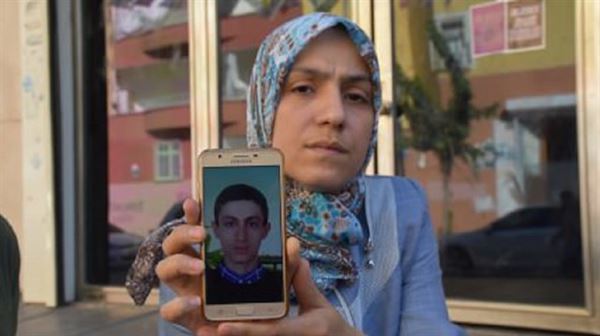Dozens of Kurdish families have been staging a silent, peaceful sit-in in front of the Diyarbakir office of the Peoples’ Democratic Party (HDP)
Dozens of Kurdish families have been staging a silent, peaceful sit-in in front of the Diyarbakir office of the Peoples’ Democratic Party (HDP) in southeastern Turkey to protest the YPG/PKK terror group’s recruitment of children.
Among them is Aysegul Bicer, 32, mother of three — two daughters and a son– who has been undergoing treatment for a brain tumor.
“I have only one son, and they deceived him. They took him to the mountains,” she said, looking at a photo of him with tears in her eyes.
Her son, Mustafa, was 16 years old when he left home on the morning of Nov. 17, 2018.
“I was at the hospital being treated for a brain tumor,” said Aysegul, recalling the day her son disappeared. “He was at home with his father.”
“He told his father he was going out with his cousins and never came back,” she added.
Mustafa was a student at Imam Hatip High School, a religious school, but later quit, switching to open education.
“His dream was to become an imam. How did they manage to deceive my son? I go crazy when I think about it,” she said.
She believes that YPG/PKK terrorists approached her son on social media and brainwashed him to join the group.
Aysegul said she saw the messages sent to her son through Facebook and Instagram, which she shared with the authorities, including the police.
“They said in the messages they were fighting against ISIS, and if my son didn’t join them, ISIS would soon come against Turkey.
“A person using a nickname texted my son for three weeks and changed his thinking,” she added.
Aysegul told Anadolu Agency she observed a big change in Mustafa’s behavior before he disappeared, including frequently becoming angry with family members.
“Two days later, he left, on Nov. 19. We were contacted by YPG terrorists who said our son was with them. They even shared his code name with us,” she said.
“Was my son spoiled? No. He was quiet, meticulous and clean. What will my son do there, covered with dust and dirt, using a stone as a pillow and the grass as a blanket? How will he sleep?”
Aysegul said she won’t give up her struggle until her son returns.
“Even though I can’t bring back my own son, I can bring many young people back or prevent them from leaving.
“We will continue our protest in front of the HDP’s office. We have a right to be there because they taught our children there. They made our children love the PKK,” she said.
She added that she was threatened by some people from the HDP and accused of receiving support from the government.
“I came here of my own will,” she stressed.
The HDP, an opposition party in Turkey with 62 seats in parliament, has long been accused by Turkish authorities of having links to terrorism. Mayors of HDP from three provinces — Diyarbakir, Mardin and Van — were suspended on terror charges last month.
Aysegul also believes that a game is being played in the region and the U.S. is using the Kurds as a tool.
“I’m Kurdish. We won’t accept this. I won’t accept this game played by the U.S.,” she said.
On Aug. 22, Hacire Akar, a Kurdish mother, staged a protest near the HDP’s office in Diyarbakir, claiming that her 21-year-old son had been taken to the mountains by the PKK after being brainwashed by members of the party. Her son returned home four days later, giving hope to a number of mothers who have suffered the same circumstances.
Another mother, Fevziye Cetinkaya, started a protest on Sept. 3, saying her son was forcibly recruited by the PKK. She was immediately joined by other mothers. Since then, the number of families in front of the building has been growing.
In its more than 30-year terror of campaign against Turkey, the PKK – listed as a terrorist organization by Turkey, the U.S. and the European Union — has been responsible for the deaths of some 40,000 people, including women and children.
The YPG is the Syrian branch of the PKK, which uses the acronym SDF as a cover for U.S. support.
The YPG has rebranded itself as the Syrian Democratic Forces (SDF) to have the necessary legitimacy it needs for a seat at the Syrian negotiation table, said a former U.S. general in 2017.
